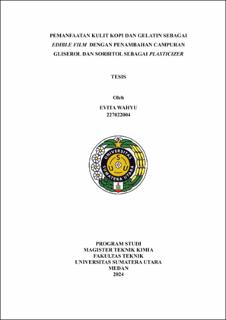Pemanfaatan Kulit Kopi dan Gelatin sebagai Edible Film dengan Penambahan Campuran Gliserol dan Sorbitol sebagai Plasticizer
Uses of Coffee Skin and Gelatin as Edible Film with the Addition of a Mixture of Glycerol and Sorbitol as Plasticizer

Date
2024Author
Wahyu, Evita
Advisor(s)
Halimatuddahliana
Harahap, Hamidah
Metadata
Show full item recordAbstract
Edible film is packaging that is renewable and can be consumed directly because it is made from natural and environmentally friendly materials. The raw materials for edible film are starch (polysaccharide) and protein, but manufacturing edible film requires additional materials in the form of plasticizer to overcome its fragility and stiffness. Plasticizers that are often used are glycerol and sorbitol. The use of glycerol as a plasticizer produces edible film with higher solubility, while sorbitol produces edible film with higher tensile strength and elongation values. However, the use of a mixture of glycerol and sorbitol as a plasticizer produces edible film with the best mechanical properties, elasticity, water vapor permeability, and stability compared to their use separately. This research aims to analyze the effect of adding gelatin and mixtures of plasticizer in preparation edible film based on coffee skin. The stages of this research consist of experimental design, preparation of raw materials, extraction of coffee skin starch, manufacturing edible film, analysis of yield and water content of starch, analysis of mechanical and physical properties of edible film, identification of functional groups, morphological structure analysis, and organoleptics of edible film. Edible film made with variations in gelatin mass of 2 g, 4 g, and 6 g combined with a variety of mixtures of plasticizer glycerol and sorbitol 10, 30, 50, and 70% (v/m starch). The research results showed that the starch extracted from coffee skins had a yield of 40.9% with a water content of 13%. The best edible film was obtained with a concentration of 10% plasticizer and 6 g gelatin, with a tensile strength value of 6.66 MPa, elongation of 57.29%, thickness of 0.05 mm, water solubility of 71.17%, and WVTR of 6.04 g/m2 hour.
Collections
- Master Theses [142]
